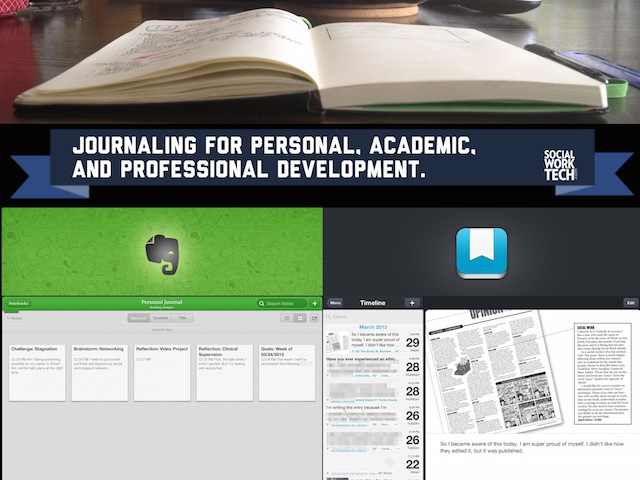I best express myself in written word which works for me as the best way to capture what I am feeling, reflect as I write, and draw some sort of conclusion at the end of this process. It allows me to process my dreams, hopes, aspirations, frustrations.I have tasted triumph and been induced into righteous rage. Lately, I find myself revisiting the same goals over again, as well as the same challenges, which is frustrating. However, after careful consideration,
On Repeat
I’m a busy guy. I often have ideas that don’t get recorded, written down, or get filed somewhere never to be seen again. Journaling helps me to take a snap-shot of what is going on in my professional, academic, personal, and clinical goals
Why Journal: Cerebral versus Emotional Processing
In one of my final clinical supervisions during the previous school year, one of my sessions was observed by my clinical supervisor. She told me a profound truth that forever changed how I practice life:
You’re too cerebral and you shy away from exploring feelings [paraphrased].
I’m glad she called me out on this behavior. My tech- / left- / organized- / ones-and-zeroes- mind that needs an explanation for everything really has a hard time dwelling on emotions. Expressing myself through words helps me to give myself that explanation I desire, but to also acknowledge and honor my feelings.
Bear in mind that writing is one of many ways you can express yourself.
Suggested Journaling Topics
Personal
- Tell A Story: Document a noteworthy story!
- Family History: What does your family mean to you? How have they influenced you to do the work that you do?
- Vent: About challenges or frustrating situation.
- Needs, Fears, Hopes Dreams: What are they and how will you get there?
- How’s Your Health?: Write about positive changes or ongoing challenges.
- Who’s in your corner?: Reflect on important relationships
Academic
- Why are you in school? How did you get to college/university?
- Who has helped you get this far? Who’s in your corner?
- Write about feelings that come up as a new/green helping professional in new and difficult client situations.
- Celebrate milestones that come up in your field placement, classroom, etc.
- Reflect on challenges that might come up with working with new people (in the classroom, field).
- What are things you like about your mentor(s)? (e.g. professors, field instructors, etc.)? What are things that you would do different?
- Talk about any ethical dilemmas that might come up.
- What do you want to get out of school? What responsibility do you have to yourself to get what you need?
Professional
- How did you end up in this profession?
- Answer an interview question: You know, those hard ones that seem to trip you up in the interview prep?
- Talk about when you had to face an ethical dilemma.
- Reflection on growth: Have you become assertive? Compare old you to new you
All of the Above
- Set a goal (or several):
- Long-term
- Short-term
- Verbalizing doubt: Assisting you to identify your barriers and some ideas to overcome them!
- Celebrate a milestone: You worked hard, girlfriend! (or guy-friend!)
- Brainstorm or hash out an idea: Sometimes an idea starts as half-baked; it may flourish when you start off.
- Self-Assessment: Identify Your…
- Strengths, privileges, and blessings.
- Challenges, needs, and feelings of inadequacy.
- Reflect on your progress: Towards goals, career, etc.
- Reflect on your important relationships: Who’s in your corner?: Reflect on what these important relationships mean to you.
Also consider poems, songs, or art as ways to express what you are feeling!
Ways To Journal
Traditional Paper Journal

There isn’t much else to say about having a bound notebook journal handy… A lot of my thoughts flow better and freely on paper. You can also take a picture of your journal pages and put them into Evernote (See: Evernote, below)
Day One App

Day One is an app that is beautiful and designed for all iOS Devices (iPhone, iPad, and the later generations of iPod Touch) and OS X (Mac). This is an applicaiton that I currently use to document my professional goals.
What I like about Day One is that has a lot of nifty features that are not overwhelming for the novice tech person. In starting the app, the user is presented with an empty canvass where they can see their last past and choose whether they want to start a text or photo post. With a text post, one can add text later and vice versa (if starting with a photo post). If you have location enabled, the app will document the time of day and weather. One can also add text mark-ups so that you can bold, italicize, format, etc. text. In the app’s options, you can set a daily reminder so that the app can remind (push) you to write. Lastly, you can set a passcode to protect your journal and you can export via an elegant-looking PDF.
What I don’t like about Day One is that it can be raise security concerns, as your data sits and is synced from cloud services (you can use iCloud or Dropbox) to your various devices. Most of the popular cloud services have had security concerns, so just a gentle word of caution that nothing is infallible and use a strong password for those services.
For some people, the app can be little pricey at approximately $15 for the universal iOS app for iPad/iPhone/iPod Touch ($5 when this article was published) and OS X app for your Mac ($10 at press time). However, I think it is money well spent for what you’re getting: an elegant, highly-functional, and uncomplicated app.
Evernote

Evernote is a free app that works on the Freemium model, i.e. premium features are going to cost you a reasonable price (currently $5/month). I am a fervent believer, user, and aficionado of Evernote! I especially love to use it to organize my social work, personal, and professional endeavors. I heavily relied on it during my academic career. And as someone that has used it since 2008, I can safely say that the majority of the bugs I have grieved about in the first three years are history.
What I like about using Evernote is that it is multi-platform and can be used in a variety of ways to record what’s on your mind. Multi-platform means that on whatever device you use to read my blog, Evernote probably has an app for it. A person can use the blank canvass to introduce not only text, but photos, audio, and (for premium users) other file types like video (e.g. .mp4, .mov, ..wmv, etc.). Premium members can upload notes that are as much as 100 MBs each, at up to 1 GB total for each month.
Some uses for Evernote can include typing out your journal entries or reflections, via some of the suggested prompts above (see: Suggested Journaling Topics). However, some of us are better at drawing our feelings, singing about them, writing poetry on paper, doodling, or even taking selfies (i.e. self-portraits) to document our feelings. Using your smartphone, you can take a picture of your drawing or art project, record an audio note of yourself speaking, take a self-portrait of yourself and describe how you are feeling at the moment, or even use a web cam to record your feelings and rather than upload to YouTube, drop your under-100 MB* video into a blank note. *non-premium members are limited to 50 MBs per note.
A Public Blog

Take your pic, as there are different flavors of blogging and I believe each has an implication for the user type:
- WordPress: Likes to appear professional, sturdy, and likes the ability to swap profile themes. Super geek status if the blog is hosted off of WordPress’s servers and on your own.
- Tumblr: Intended to be informal and the user likes to mix in pictures, videos, or social commentary of other users in between their own commentary. Connected with a community of other bloggers. Also: Loves memes [a meme is an esoteric running joke].
- Blogger: Easy to use, sort of bland, but with the potential of eliciting lots of comments on your blog.
- MySpace: Just kidding, no one uses MySpace.
Please, please, please, if you’re going to blog publicly, I would recommend reading my article about your online identity, peruse your social work ethical standards (US = NASW Code of Ethics, UK = BASW Code of Ethics), and consult with your advisors, mentors, and supervisors.
Some Ethical Considerations
NOTHING that is ever put online, whether it is in the Cloud, on a personal blog, or even via email, is 100% secure. Even with a paper journal, those can be misplaced or lost. With that, I offer some guidelines for all types of journaling.
- Think about your professional image – what if your journal entries got out or into the wrong hands
- Don’t ever state your client’s names.
If blogging:
- Refrain from writing about your client if your client can figure out it’s him or her you are blogging about.
- Don’t complain about work, no matter how bad, oppressive, or dysfunctional it is.
- Self-aggrandizing about your work with clients means that you are in the wrong profession.
- Most importantly: You carry the mantle of social workers everywhere when you identify as a social worker; if you think that making “baby snatching” jokes or criticizing your clients makes for good writing, you are in the wrong profession.
How Will You Use Journaling for your Personal, Academic, or Professional Development?
Special Thanks for My Peer Reviewers:
- Artie Guerrero: Who validated this article for relevancy.
- Jimmy Young: Who caught several grammatical errors, contributed to the Academic journal prompt section, and runs a killer social work and technology blog you should check out.
- Leslie Roberts: Who eagerly jumped at my call on Twitter for help and social worked me through feelings of doubt with her review. Check out her site at Protected Paws.
Thanks for reading 🙂









And here we have yet another great post from Social Work Tech! Thanks for laying this out in such a detailed and helpful way. I’ll be linking my readers back to this post in hopes that it will help them to make informed decisions about they may want to express themselves. I also appreciated your personal sharing at the beginning. It’s something how we all have things to work on. Sometimes I might feel more emotional than cerebral. Thanks for reminding me to use my strengths, but to strive for good balance as well.
Thank you!! The value of Journaling can never be touted enough. For all areas of your life, self assessment through writing is transforming. I appreciate the list of tools you’ve provided. Organizing alone has its revelatory process and I too love evernote. I need the multi media ability and the organizational capacity to really find the point. At the same time, the ability to write down thoughts immediately, things over heard, moments or experiences is vital. You’d be surprised how many of those random thoughts you’ve had throught the day can impact you later. Thank you for sharing. Your blog always ‘social works’ me through understanding how new technology can make me and my work better 🙂